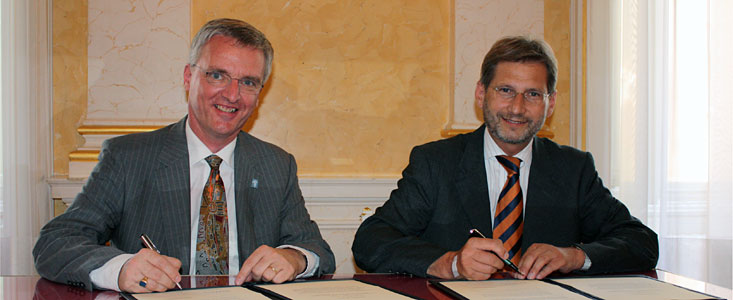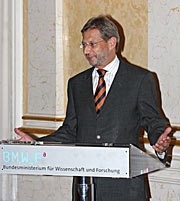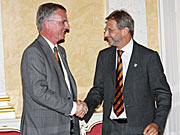Press Release
Austria to join ESO on 1 July 2008
30 June 2008
Today, at a ceremony in Vienna, the Austrian Minister for Science and Research, Johannes Hahn and the ESO Director General, Tim de Zeeuw, signed the formal Accession Agreement between Austria and ESO, paving the way for Austria to join ESO as its 14th member state by 1 July this year.
"This will not only give the high-quality Austrian astronomical community full access to ESO's facilities, it will give Austrian scientists a say, together with their colleagues from the other member-states, in shaping the future of our science," said Tim de Zeeuw.
The signing of the Agreement followed the unanimous approval by the ESO Council during its meeting in Prague on 3 June and the decision by the Austrian Government on 25 June.
At the ceremony, Minister Hahn emphasised that the accession of Austria to ESO is a strong commitment to fundamental research and particularly to astronomy. "This sustainable investment enables Austrian science to gain access to a leading, international research infrastructure, and provides an important impulse for the attractiveness of Austria as a place for research," he said. "With the signature of the agreement today we bring a long discussion to a happy end and Austrian astronomy to new horizons."
Since the Agreement means accession to an international convention, the agreement must now be submitted to the Austrian Parliament for ratification.
"It is not possible to plan for radical changes, but ideal conditions will be created by this accession, which will strengthen Austrian and European astronomy. It is now for the scientists to use this opportunity," concluded the Austrian Minister.
More information
ESO is the European Organisation for Astronomical Research in the Southern Hemisphere. Created in 1962, ESO provides state-of-the-art research facilities to European astronomers and is supported by thirteen member states.
ESO operates three observational sites in the Chilean Atacama desert. At La Silla, 600 km north of Santiago de Chile and at 2400 m altitude, ESO operates several medium-sized optical telescopes. The Very Large Telescope (VLT) is located on Paranal, a 2600 m high mountain south of Antofagasta, which also hosts the VLT Interferometer and two survey telescopes, the VST and VISTA. The third site is the 5000 m high Llano de Chajnantor, near San Pedro de Atacama. Here a new submillimetre telescope (APEX) is in operation, and a giant array of 12-m submillimetre antennas (ALMA) is being constructed in collaboration with North America, East Asia and Chile. ESO is currently engaged in design studies for an Extremely Large optical/near-infrared Telescope, the E-ELT.
Contacts
Henri Boffin
ESO
Garching, Germany
Tel: +49 89 3200 6222
Email: hboffin@eso.org
Valentina Rodriguez
ESO
Chile
Tel: +56 2 463 3123
Email: vrodrigu@eso.org
Our use of Cookies
We use cookies that are essential for accessing our websites and using our services. We also use cookies to analyse, measure and improve our websites’ performance, to enable content sharing via social media and to display media content hosted on third-party platforms.
ESO Cookies Policy
The European Organisation for Astronomical Research in the Southern Hemisphere (ESO) is the pre-eminent intergovernmental science and technology organisation in astronomy. It carries out an ambitious programme focused on the design, construction and operation of powerful ground-based observing facilities for astronomy.
This Cookies Policy is intended to provide clarity by outlining the cookies used on the ESO public websites, their functions, the options you have for controlling them, and the ways you can contact us for additional details.
What are cookies?
Cookies are small pieces of data stored on your device by websites you visit. They serve various purposes, such as remembering login credentials and preferences and enhance your browsing experience.
Categories of cookies we use
Essential cookies (always active): These cookies are strictly necessary for the proper functioning of our website. Without these cookies, the website cannot operate correctly, and certain services, such as logging in or accessing secure areas, may not be available; because they are essential for the website’s operation, they cannot be disabled.
Functional Cookies: These cookies enhance your browsing experience by enabling additional features and personalization, such as remembering your preferences and settings. While not strictly necessary for the website to function, they improve usability and convenience; these cookies are only placed if you provide your consent.
Analytics cookies: These cookies collect information about how visitors interact with our website, such as which pages are visited most often and how users navigate the site. This data helps us improve website performance, optimize content, and enhance the user experience; these cookies are only placed if you provide your consent. We use the following analytics cookies.
Matomo Cookies:
This website uses Matomo (formerly Piwik), an open source software which enables the statistical analysis of website visits. Matomo uses cookies (text files) which are saved on your computer and which allow us to analyze how you use our website. The website user information generated by the cookies will only be saved on the servers of our IT Department. We use this information to analyze www.eso.org visits and to prepare reports on website activities. These data will not be disclosed to third parties.
On behalf of ESO, Matomo will use this information for the purpose of evaluating your use of the website, compiling reports on website activity and providing other services relating to website activity and internet usage.
Matomo cookies settings:
Additional Third-party cookies on ESO websites: some of our pages display content from external providers, e.g. YouTube.
Such third-party services are outside of ESO control and may, at any time, change their terms of service, use of cookies, etc.
YouTube: Some videos on the ESO website are embedded from ESO’s official YouTube channel. We have enabled YouTube’s privacy-enhanced mode, meaning that no cookies are set unless the user actively clicks on the video to play it. Additionally, in this mode, YouTube does not store any personally identifiable cookie data for embedded video playbacks. For more details, please refer to YouTube’s embedding videos information page.
Cookies can also be classified based on the following elements.
Regarding the domain, there are:
- First-party cookies, set by the website you are currently visiting. They are stored by the same domain that you are browsing and are used to enhance your experience on that site;
- Third-party cookies, set by a domain other than the one you are currently visiting.
As for their duration, cookies can be:
- Browser-session cookies, which are deleted when the user closes the browser;
- Stored cookies, which stay on the user's device for a predetermined period of time.
How to manage cookies
Cookie settings: You can modify your cookie choices for the ESO webpages at any time by clicking on the link Cookie settings at the bottom of any page.
In your browser: If you wish to delete cookies or instruct your browser to delete or block cookies by default, please visit the help pages of your browser:
Please be aware that if you delete or decline cookies, certain functionalities of our website may be not be available and your browsing experience may be affected.
You can set most browsers to prevent any cookies being placed on your device, but you may then have to manually adjust some preferences every time you visit a site/page. And some services and functionalities may not work properly at all (e.g. profile logging-in, shop check out).
Updates to the ESO Cookies Policy
The ESO Cookies Policy may be subject to future updates, which will be made available on this page.
Additional information
For any queries related to cookies, please contact: pdprATesoDOTorg.
As ESO public webpages are managed by our Department of Communication, your questions will be dealt with the support of the said Department.




